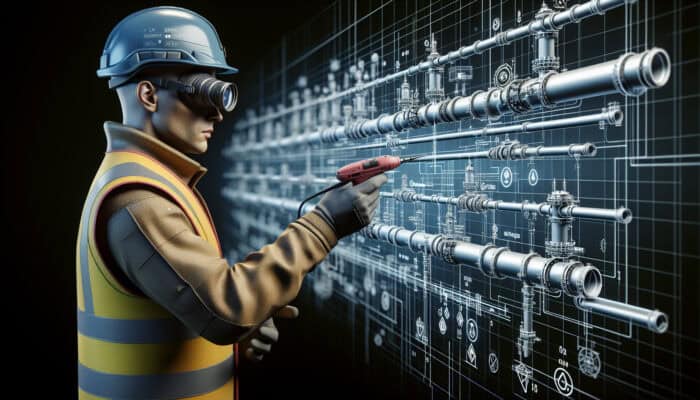Gain Invaluable Knowledge on Natural Gas Line Services
What Are the Essential Elements of Natural Gas Line Services?

In West Vancouver, natural gas line services encompass the crucial processes involved in installing, maintaining, and repairing the pipelines responsible for transporting natural gas to both residential and commercial properties. These services are vital for ensuring the safe and efficient movement of gas, which is essential for heating and cooking. Specialists in this field adhere to strict safety regulations and employ cutting-edge technology to monitor and uphold the integrity of gas lines. By appreciating these services, homeowners and businesses alike can understand the necessity of hiring qualified professionals to address their natural gas requirements, thereby ensuring safety and operational performance.
The reliable operation of natural gas lines is not only essential for comfort but also critical for safety. Proper installation is imperative to comply with local regulations and codes. Skilled professionals in gas line services ensure that all installations adhere to the latest safety standards and industry best practices. Following these guidelines significantly reduces the risk of leaks, which can lead to perilous situations. Moreover, maintaining a well-functioning natural gas line can enhance energy efficiency, leading to substantial reductions in utility bills, thereby making it a practical and financially advantageous option for consumers.
Explore the Comprehensive Range of Natural Gas Line Services Offered
The variety of natural gas line services includes numerous offerings tailored to meet the distinct needs of clients. The primary services typically include:
- New installations: Establishing gas lines for newly built homes or commercial properties.
- Regular maintenance checks: Conducting periodic inspections to ensure existing gas lines are functioning optimally.
- Emergency repairs: Swiftly addressing urgent issues, such as leaks or system failures.
- Upgrades to existing systems: Enhancing gas lines to improve efficiency or comply with updated regulatory standards.
Each of these services is crucial for maintaining the seamless operation of the entire gas delivery network. For example, new installations require meticulous planning and execution to align with safety regulations. Regular maintenance checks are essential for identifying potential problems before they develop into major issues. Emergency repairs are vital since gas leaks can pose serious health and safety threats; timely intervention can avert disasters. Upgrading older systems not only boosts efficiency but also integrates advanced safety features, reflecting the latest advancements in the sector.
Why Is It Crucial to Engage Professional Gas Line Services?
Hiring professional gas line services is vital for ensuring compliance with safety standards and regulations. Certified technicians possess the expertise necessary for accurately installing and maintaining gas lines, thus significantly reducing the risk of hazardous incidents, such as gas leaks. The significance of employing qualified professionals cannot be overstated; improper management of gas lines can result in catastrophic outcomes, including explosions or carbon monoxide poisoning, placing lives at risk.
Additionally, qualified technicians remain informed about the latest regulations and industry innovations. They are trained to detect potential issues that may not be immediately visible to the untrained eye, facilitating timely interventions that safeguard both homeowners and businesses. Engaging experienced professionals for gas line services provides peace of mind, assuring clients that their systems are overseen by experts who adhere to both local and national safety protocols.
What Are the Benefits of Regular Gas Line Maintenance?

<pRoutine maintenance of natural gas lines is crucial for several reasons, primarily focusing on safety, efficiency, and durability. By investing in routine inspections, homeowners can effectively avert gas leaks that pose direct safety hazards. These proactive measures ensure that systems operate efficiently, minimising energy waste and lowering utility costs over time.
Moreover, consistent maintenance extends the operational lifespan of gas lines, potentially saving homeowners from incurring substantial costs related to repairs or replacements. Maintenance protocols typically involve thorough examinations for indications of wear, corrosion, and leaks, allowing for timely repairs or replacements before problems escalate. This proactive approach is particularly valuable in areas like West Vancouver, where environmental factors can significantly affect the durability of gas lines. Ultimately, professional maintenance cultivates a safe and efficient living environment.
Insights from Professionals on Natural Gas Line Services in West Vancouver
How Do Experts Guarantee the Safety of Gas Lines?
Professionals implement a comprehensive array of stringent safety protocols to ensure that gas lines operate safely and effectively. These protocols usually encompass regular inspections, advanced monitoring technologies, and strict adherence to safety regulations established by national standards. By integrating technologies such as pressure sensors and smart monitoring systems, experts can identify and resolve issues before they escalate into serious problems.
Essential safety measures include:
- Routine inspections: Scheduled evaluations aimed at identifying and rectifying potential hazards.
- Leak detection technologies: Employing sensors and detectors to monitor for gas leaks.
- Employee training: Ongoing education for technicians regarding safety protocols and emergency response strategies.
- Emergency response plans: Established procedures for swiftly addressing gas leaks or explosions.
Through these proactive strategies, technicians can significantly diminish risks associated with gas lines. For example, in West Vancouver, professionals may utilise cutting-edge leak detection systems that quickly alert them to any irregularities, allowing for immediate corrective action. This proactive approach not only protects the welfare of residents but also fosters public trust in natural gas services.
What Training Do Gas Line Technicians Undergo?

Gas line technicians receive extensive training to ensure they are thoroughly prepared to navigate the complexities of installation and maintenance safely. This training typically merges classroom education with hands-on experience. Technicians must complete certification courses covering the fundamentals of gas line systems, safety procedures, and local regulations.
Continuing education is a crucial component of a technician’s career, keeping them informed about the latest advancements in technology and regulatory updates. This ongoing learning ensures that technicians remain competent amidst evolving safety standards and modern gas line technologies. Furthermore, many professionals participate in workshops and industry conferences, further enhancing their skill sets and knowledge base.
Technicians often gain practical experience through apprenticeships, working under experienced professionals to learn the nuances of gas line installation and maintenance. This blend of theoretical knowledge and real-world training equips them to swiftly identify potential issues and implement effective solutions.
How Can Homeowners Benefit from Expert Assistance?
Homeowners can reap considerable rewards from the expert assistance provided by professionals in the natural gas line services sector. By consulting with seasoned technicians, homeowners gain invaluable insights into maintaining their gas lines, including recognising early warning signs of potential issues. This proactive engagement can lead to significant cost savings by minimising the likelihood of future, expensive repairs.
Moreover, expert advice includes understanding the implications of upgrades or modifications to existing systems. Technicians can assist homeowners in selecting energy-efficient options that enhance safety and reduce energy costs. Additionally, professionals can provide tailored recommendations based on the unique circumstances of each home, such as local climate conditions or the age of existing gas lines.
Maintaining ongoing communication with industry experts enables homeowners to stay informed about best practices for gas line safety and efficiency. This continuous relationship fosters a sense of security, knowing that an expert is readily available to address concerns or provide guidance as required.
Detailed Processes for Gas Line Installation and Maintenance
What Are the Key Steps Involved in Installing New Gas Lines?
The installation of new gas lines involves a meticulously organised series of steps designed to ensure safety and compliance with regulations. Initially, a thorough site assessment is conducted to identify the most suitable route for the gas line, considering existing structures, underground utilities, and local regulations. This foundational step is critical in shaping the overall installation process.
Once the site has been thoroughly assessed, technicians proceed to the planning phase, which involves determining the necessary materials and specific installation techniques to be employed. This phase also includes obtaining any required permits from local authorities, which is essential for ensuring compliance with safety regulations.
Subsequently, the actual installation process commences, typically starting with trenching. Skilled technicians excavate trenches along the chosen route, ensuring they are the correct depth and width to accommodate the gas line. After trenching, the next phase is pipe laying, where high-quality pipes are meticulously positioned and connected to the primary gas supply. Finally, extensive testing for leaks and safety is conducted before backfilling the trenches and restoring the site.
Effective installation not only guarantees efficient gas delivery but also provides homeowners with peace of mind. By adhering to safety standards throughout the process, professionals significantly minimise the risks associated with gas line installations.
What Specific Maintenance Tasks Are Required for Gas Lines?
Routine maintenance of gas lines is essential for ensuring their safety and longevity. This maintenance involves regular inspections and checks, focusing on identifying potential issues early. Technicians typically look for signs of leaks, corrosion, and secure connections during these inspections, which are critical for the overall functionality of the system.
A thorough maintenance routine generally encompasses:
- Leak detection: Employing specialised equipment to promptly identify any gas leaks.
- Corrosion assessments: Checking for any degradation of pipes, especially in damp environments.
- Connection checks: Ensuring that all fittings and connections are secure and functioning correctly.
- System pressure testing: Confirming that the gas pressure remains within safe operational limits.
By conducting these routine maintenance checks, technicians can address issues that could lead to safety hazards. For example, a minor leak detected early is far simpler and less costly to repair than a significant rupture that could occur due to neglect. Homeowners in West Vancouver, where environmental elements can substantially impact gas lines, should prioritise routine maintenance to ensure their systems remain in optimal condition.
How Frequently Should Gas Lines Be Inspected for Safety?
It is generally recommended to schedule annual inspections of gas lines to ensure their safety and operational efficiency. However, the frequency of these inspections may vary based on several factors, including the age of the system and the local environment. For older gas lines or those located in areas more susceptible to environmental stress, more frequent checks may be necessary to proactively identify issues.
Regular inspections typically encompass a comprehensive evaluation of the entire gas line system. This includes assessing for leaks, verifying the integrity of the pipe material, and ensuring that all connections remain secure and intact. Homeowners should remain vigilant for signs of potential problems, such as unusual odours or sounds, and report any concerns to professionals immediately.
Ultimately, maintaining a proactive inspection routine enhances safety and extends the lifespan of gas lines. Homeowners should engage with qualified professionals who can recommend an appropriate inspection schedule tailored to their specific circumstances.
Comprehending Safety Protocols and Regulations in Gas Line Services
What Are the Established Safety Regulations for Gas Lines?
Safety regulations for gas lines are established by national and local authorities to ensure the safe operation of gas systems. These standards encompass various aspects of installation, maintenance, and emergency response protocols, providing a comprehensive framework for gas line services.
Professionals in the field must comply with these regulations, which typically include:
- Installation guidelines: Specifications regarding materials, techniques, and safety measures during installation.
- Maintenance protocols: Regular checks and standards for maintaining system integrity.
- Emergency procedures: Established protocols for responding to gas leaks or system failures.
- Training requirements: Mandated training for technicians to ensure they are prepared to manage gas lines safely.
Adhering to these safety standards protects both service providers and consumers who rely on natural gas for heating and cooking. In communities like West Vancouver, compliance with these regulations fosters trust between service providers and residents, ensuring that gas systems operate safely and efficiently.
How Can You Effectively Detect and Respond to Gas Leaks?
Promptly detecting gas leaks is essential for maintaining safety within homes and businesses. Gas leaks can often be identified by their distinctive smell, akin to rotten eggs, due to the addition of an odourant called mercaptan. Homeowners may also notice hissing sounds near gas lines or observe dead vegetation around a leak.
Upon suspecting a gas leak, immediate action is crucial. Homeowners should:
- Evacuate the area: Ensure everyone exits the premises swiftly and safely.
- Avoid ignition sources: Do not use candles, matches, or electrical devices that could ignite a fire.
- Shut off the gas supply: If safe to do so, locate the main gas shut-off valve and turn it off.
- Contact professionals: Immediately call emergency services or a gas line repair service for assistance.
These swift actions can prevent accidents and protect lives. Professionals arriving at the scene will assess the situation, perform necessary repairs, and recommend appropriate next steps to restore gas service safely.
Understanding Compliance with Canadian Gas Line Regulations
Compliance with Canadian gas line regulations is essential for professionals in the industry. These regulations are designed to protect both service providers and consumers, ensuring that gas lines are installed, maintained, and operated safely. Professionals must familiarise themselves with the specific regulations governing their region, including provincial standards and national guidelines.
Adhering to these regulations involves:
- Obtaining permits: Necessary authorisations before installation or significant repairs.
- Regular training: Keeping technicians current on safety practices and regulatory updates.
- Documentation: Maintaining thorough records of inspections, maintenance, and repairs performed.
- Quality materials: Utilising approved materials for installations and repairs to meet safety standards.
For residents in West Vancouver, compliance with these regulations translates into enhanced safety and reliability of their natural gas service. Engaging qualified professionals who prioritise adherence to regulations fosters confidence in the safety and efficiency of gas lines.
Research-Backed Benefits of Natural Gas Line Services in West Vancouver
What Efficiency Benefits Does Natural Gas Provide?
Natural gas is renowned for its impressive efficiency, particularly in heating and cooking applications. Compared to alternative fuel sources, natural gas consistently offers substantial energy savings, significantly lowering utility bills for both homeowners and businesses. The high thermal efficiency of natural gas appliances results in quicker cooking times and more effective heating, making it a cost-effective energy solution.
Research demonstrates that natural gas systems frequently outperform electric systems in terms of efficiency. For example, gas furnaces can achieve efficiency ratings exceeding 90%, while electric systems may struggle to reach this level of performance. This efficiency not only results in reduced energy costs but also diminishes the environmental impact, a critical consideration for many Canadians.
Furthermore, the efficiency of natural gas lines can be enhanced through regular maintenance. By ensuring that gas lines remain free from leaks and corrosion, homeowners can optimise the performance of their heating and cooking systems, further improving energy use and cost savings.
How Does Natural Gas Influence Environmental Sustainability?
Natural gas is often regarded as a cleaner alternative to other fossil fuels, primarily due to its lower emissions of greenhouse gases. When combusted, natural gas produces significantly fewer CO2 emissions than coal or oil, making it a more environmentally friendly option for meeting energy demands. This characteristic positions natural gas as an essential element in the energy transition towards sustainability.
In West Vancouver, where environmental concerns are paramount, utilising natural gas can help to reduce the overall carbon footprint of households and businesses. Additionally, when gas lines are well-maintained, the risks of leaks—which can contribute to methane emissions—are significantly minimised. Regular inspections and maintenance services play a vital role in ensuring that gas systems operate efficiently and sustainably.
Research also indicates that the proper use of natural gas can facilitate the integration of renewable energy sources. As a stable energy source, natural gas can support intermittent renewables like wind and solar, providing a consistent energy supply while aiding the overall transition to a greener energy landscape.
What Economic Advantages Are Associated with Using Natural Gas?
The economic benefits of utilising natural gas are multifaceted, making it a compelling choice for energy supply in both residential and commercial environments. Natural gas is often more affordable than electricity, resulting in consistent savings on energy expenses. Various economic studies have highlighted the cost-effectiveness of natural gas, particularly in regions where it is readily accessible.
Moreover, the natural gas sector significantly contributes to local economies, creating jobs in both service and infrastructure sectors. The demand for skilled technicians in gas line maintenance and installation generates employment opportunities, bolstering local economic growth. In West Vancouver, a robust natural gas market can stimulate job creation while providing residents with reliable energy options.
Investments in natural gas infrastructure yield long-term economic benefits. Upgrading gas lines and adopting modern technologies not only enhances efficiency but also establishes a solid energy framework that can support future developments. This forward-thinking strategy positions communities for sustained economic vitality while promoting responsible energy consumption practices.
How Does Natural Gas Improve Residential Safety?
Natural gas services incorporate essential safety features designed to reduce the risks associated with gas usage in homes. Key safety components include automatic shut-off valves, which instantly cease gas flow in the event of a leak or emergency. This mechanism significantly lessens the risk of explosions or fires, providing an additional safety layer for residents.
In addition to shut-off valves, modern natural gas systems frequently feature leak detection systems. These systems use sensors to identify even minor leaks, promptly alerting homeowners to potential issues. By addressing leaks early, residents can avert hazardous situations and ensure the safety of their families and properties.
The integration of such safety features not only provides peace of mind but also complies with regulations set by governing bodies. By prioritising safety in gas line services, professionals create an environment where residents can confidently utilise natural gas for heating and cooking purposes.
What Reliability Benefits Does Natural Gas Provide?
Natural gas is widely recognised for its reliability, supplying a stable energy source that is less susceptible to interruptions compared to electricity. In regions like West Vancouver, where winter temperatures can plummet, the dependability of natural gas for heating is essential. Gas lines are designed to operate consistently, ensuring homes and businesses remain warm and functional during the colder months.
Moreover, natural gas systems are generally less affected by weather-related events, such as storms or power outages, which can disrupt electrical supply. This reliability guarantees that residents have continuous access to heating and cooking capabilities, even in adverse conditions.
The infrastructure supporting natural gas delivery is built for durability, with many gas lines having lifespans that exceed several decades when maintained appropriately. This longevity contributes to a reliable energy source that residents can depend on for years to come, enhancing the overall quality of life in the community.
Choosing the Optimal Gas Line Service Provider
What Key Attributes Should You Seek in a Gas Line Service Company?
Choosing a reputable gas line service company is crucial for ensuring the quality and safety of gas line installation and maintenance. Homeowners should look for companies that employ certified technicians with the requisite training and experience. This qualification directly influences the effectiveness of the services offered.
Customer reviews and testimonials are invaluable tools for evaluating a company’s reputation. Positive feedback from previous clients can instil confidence in prospective customers regarding the reliability and professionalism of the service provider. Additionally, a company’s history in managing emergencies can indicate its responsiveness and expertise.
Transparency in pricing is another vital consideration. A trustworthy company will provide detailed estimates outlining the scope of work and associated costs, ensuring clients understand what to expect. Comprehensive service options, including emergency repairs and maintenance programmes, further enhance a company’s appeal, reflecting a commitment to customer satisfaction and convenience.
How to Thoroughly Assess Service Quotes and Contracts?
When receiving service quotes for gas line work, it is essential to evaluate them meticulously to ensure both value and quality. A well-structured quote should clearly delineate the scope of work, materials to be used, and associated costs. This transparency allows homeowners to effectively compare offerings from different providers.
Contract evaluation is equally significant. Homeowners should carefully scrutinise contracts to ensure they accurately reflect the services quoted. Contracts should explicitly outline timelines, costs, warranties, and any guarantees offered by the service provider. This documentation protects both parties and provides a clear framework for the work to be executed.
Additionally, homeowners should inquire about any potential hidden costs, such as fees for permits or inspections, to avoid unexpected expenses. A reputable company will be upfront about all costs, fostering trust and ensuring a positive working relationship.
Why Does Local Expertise in Gas Line Services Matter?
Engaging a local gas line service provider presents numerous advantages grounded in their familiarity with regional regulations and conditions. Local companies possess an in-depth understanding of the specific requirements and standards governing gas line services in their area, ensuring compliance with safety protocols.
Furthermore, local expertise enables quicker response times in emergencies. In situations such as gas leaks or system failures, having a nearby service provider can significantly mitigate risks and restore service promptly. Local professionals are also more likely to have established relationships with community members, enhancing trust and accountability.
Additionally, local companies can offer tailored solutions based on the unique environmental conditions of West Vancouver. Their knowledge of local infrastructure and potential challenges allows them to devise effective strategies for gas line installations and maintenance, ultimately benefiting the community.
What Advantages Are Associated with Regular Maintenance and Inspections?
Regular maintenance and inspections of gas lines yield numerous benefits centred around safety and efficiency. Consistent check-ups enable technicians to identify potential issues early, addressing them before they escalate into significant problems. This proactive approach not only safeguards lives but also minimises repair costs for homeowners.
Moreover, routine inspections ensure that gas lines operate at peak efficiency. Well-maintained systems consume less energy, leading to lower utility bills. By adhering to a maintenance schedule, homeowners can maximise the lifespan of their gas lines, delaying the need for costly replacements.
Furthermore, regular inspections enhance compliance with safety regulations. Service providers can verify that gas lines meet necessary standards, fostering a safe environment for residents. This commitment to safety underscores the importance of professional gas line services, building trust within the community.
What Are the Licensing and Insurance Requirements for Gas Line Services?
When selecting a gas line service provider, it is essential to ensure that they possess the necessary licenses to operate legally. Licensing requirements vary by region but typically involve compliance with local and national safety standards. A licensed technician demonstrates that they have undergone the requisite training and possess the expertise to perform gas line services safely.
Insurance is equally critical. A reputable gas line service provider should carry appropriate liability insurance to protect homeowners from potential damages or accidents that may occur during service. This insurance coverage provides peace of mind, knowing that clients are safeguarded against unforeseen circumstances.
Homeowners should always request proof of licensing and insurance before engaging a service provider. This step ensures compliance with legal requirements and establishes trust in the chosen company’s professionalism and reliability.
Future Innovations in Natural Gas Line Services
What Innovations Are Emerging in the Gas Line Services Industry?
The field of gas line services is on the cusp of significant innovations aimed at enhancing safety, efficiency, and customer experience. One notable advancement is the introduction of smart gas meters, which enable homeowners to monitor energy usage in real-time. These devices can provide insights into consumption patterns, empowering residents to make informed decisions about their energy use.
Additionally, advancements in leak detection technology are continuously evolving, with more sophisticated sensors being developed. These systems can detect leaks more accurately and respond faster, thereby enhancing safety measures. Professionals in the field are increasingly adopting these technologies to improve service reliability and safety.
Efficient installation techniques are also being refined, including trenchless technology, which minimises disruption during pipe installation or repair. This innovation allows service providers to install gas lines with reduced excavation, thereby minimising environmental impact and enhancing the overall customer experience.
These trends indicate a shift towards greater efficiency and safety in gas line services, positioning the industry to meet the evolving needs of consumers in West Vancouver and beyond.
How Will Regulations Adapt to Future Changes in the Industry?
As the gas line services industry evolves, so too will the regulations governing its operation. Future regulations are likely to put a premium on enhancing safety standards, promoting sustainability, and integrating advanced technologies into gas line services. Regulatory bodies may introduce stricter requirements for inspection frequencies and maintenance protocols to ensure that systems remain safe and efficient.
Moreover, there is a growing emphasis on environmental responsibility. Future regulations may encourage the adoption of cleaner technologies and practices, aligning with global initiatives aimed at reducing carbon emissions. This shift may lead to the implementation of standards that promote the use of renewable energy sources in conjunction with natural gas.
For professionals in the industry, staying informed about these regulatory changes will be crucial. Engaging in continuous education and training will ensure compliance and success in adapting to the changing landscape of gas line services.
How Does Natural Gas Contribute to Sustainable Energy Goals?
Natural gas is increasingly viewed as a transitional energy source on the path to sustainability. As nations strive to reduce carbon emissions, natural gas plays a critical role in facilitating the integration of renewable energy sources. Its reliability complements intermittent renewables, such as wind and solar, ensuring consistent energy delivery.
In West Vancouver, utilizing natural gas alongside investments in renewable energy can create a balanced energy portfolio. As advancements in technology enhance the efficiency of natural gas systems, their role in reducing overall greenhouse gas emissions will become increasingly pronounced.
The future of natural gas is not solely about fossil fuel dependency; rather, it is about leveraging its benefits while transitioning towards a more sustainable energy future. By embracing natural gas as a bridge fuel, communities can enjoy a reliable energy source while paving the way for a cleaner, greener energy landscape.
Frequently Asked Questions Regarding Natural Gas Line Services
What Are the Common Signs of a Gas Leak?
Signs of a gas leak include a rotten egg smell, hissing sounds near gas lines, and dead vegetation in the area. If you suspect a leak, evacuate the area immediately and contact a professional for assistance.
How Often Should I Schedule Maintenance for My Gas Lines?
It is advisable to schedule maintenance for your gas lines at least once a year. More frequent checks may be necessary for older systems or those exhibiting signs of wear and tear.
What Should I Do If I Detect a Gas Smell in My Home?
If you smell gas, evacuate the premises immediately, avoid igniting any flames or electrical devices, and contact emergency services or a gas repair professional right away.
What Are the Expected Costs for New Gas Line Installation?
Costs associated with new gas line installation can vary significantly based on factors such as the length of the line, materials used, and local labour rates. It is prudent to request detailed estimates from multiple providers for effective price comparison.
How Can I Verify if My Gas Line Service Provider Is Reputable?
To ensure your gas line service provider is reputable, check for certifications, read customer reviews, and inquire about their experience and adherence to safety regulations.
What Types of Gas Appliances Can Be Connected to My Gas Line?
You can connect various gas appliances to your gas line, including furnaces, water heaters, stoves, and dryers. Always consult a professional to ensure proper installation and the safety of your property.
Are Gas Lines Environmentally Safe?
Natural gas is considered a cleaner alternative to other fossil fuels, as it produces fewer greenhouse gas emissions. However, proper maintenance is crucial for minimising leaks and reducing environmental impact.
What Should I Know About Gas Line Repairs?
Qualified professionals should always manage gas line repairs. If you suspect an issue, contact a service provider immediately to safely assess and address the situation.
Can I Perform My Own Maintenance on Gas Lines?
It is not advisable to conduct maintenance on gas lines yourself. Only licensed professionals should handle inspections, repairs, and maintenance to ensure safety and compliance with regulations.
How Can I Find Local Gas Line Service Providers in West Vancouver?
To locate local gas line service providers in West Vancouver, you can search online directories, ask for recommendations from neighbours, or consult local business listings for reputable companies.
Connect with us on Facebook for more updates!
Presented By: Natural Gas Line Services in West Vancouver
The Article: Natural Gas Line Services in West Vancouver: Expert Solutions First Published On: https://pacificbluemechanical.ca/
The Article Natural Gas Line Services: Expert Solutions in West Vancouver Was Found On https://limitsofstrategy.com

